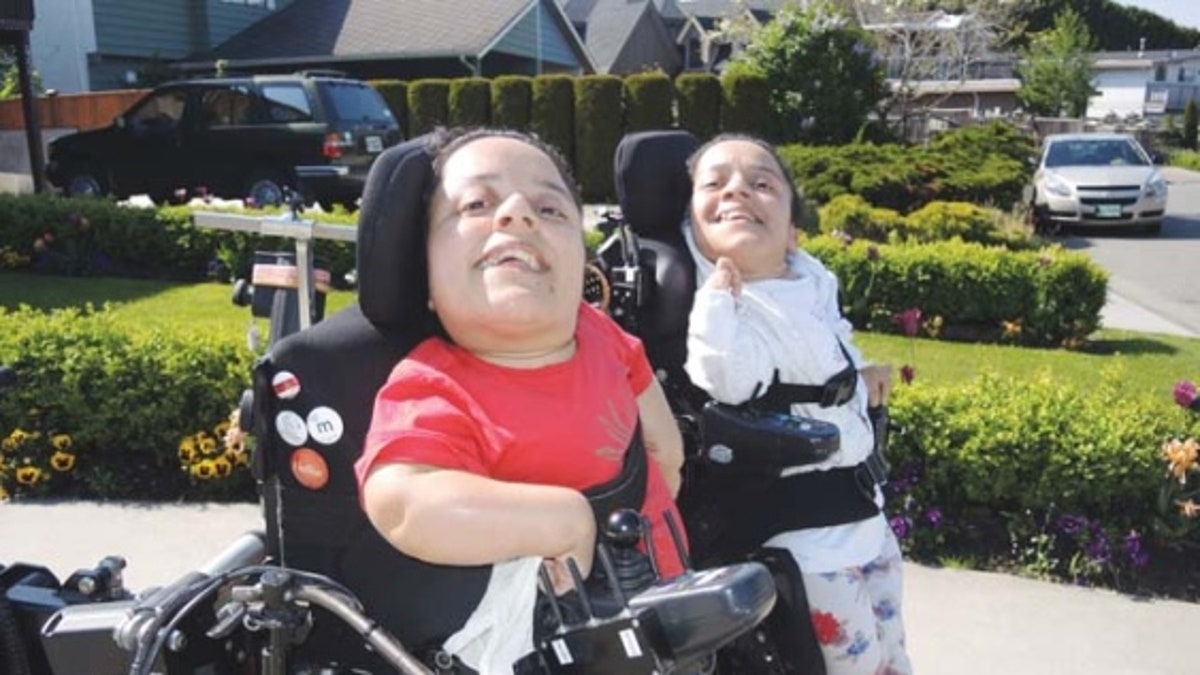
Deepi Leihl, left, and twin sister Jotti, say they express their gratitude for their mother, Jaswinder, as often as they can. (The Richmond News)
It was May 23, 1981, and Jaswinder Leihl was expecting a baby.
But there would be a surprise: Leihl gave birth to twin girls.
A few months later, when she noticed her daughters were not growing, she was told that her girls, Deepi and Jotti, had a rare condition called metatropic dwarfism.
It is the moment all new parents fear. A diagnosis that sends their thought process abruptly from whether a newborn will have his mom's brown eyes to finding the genetic link in the family that could be the cause.
There was no link, at least as far as their parents could tell. There was no immediate answer to how the twins were born with a condition that, in their case, meant they would never be able to use their arms or legs or grow taller than 3 feet.
Deepi and Jotti, now 32, (Jotti is six minutes older than Deepi) require motorized wheelchairs with a specialized joystick and assistance to perform life's simplest tasks. Neither can eat or bathe without help and both require a bed pan.
The girls' father, who works in landscaping, was always supportive, but they relied heavily on their mother.
"She had so much stress," Deepi told FoxNews.com in a telephone interview from her home in Richmond, B.C., which is south of Vancouver. "And you have to figure, times that stress by two."
Jaswinder Leihl worked the night shift at a bakery in town. She lost any chance at a good night's sleep, but the shift guaranteed that she was home for the girls when they left for school in the morning and came back.
"She would take naps; I don't think she ever slept," Deepi said.
[pullquote]
The girls said they express their gratitude for their mother as often as they can and remembered specific moments when their mother's sacrifice was most apparent.
Deepi, who volunteers at a radio station, recalled a time when she was at summer camp on the Squamish River. She was on a picnic table when she fell off. She was unable to brace herself and broke both legs.
"That was when my mother was just completely there for me," Deepi said. "She made sure that I was all right and as comfortable as I could be."
Metatropic dwarfism is a rare form of skeletal dysplasia characterized by extremely small stature. The disorder is often associated with a narrow thorax, short ribs and a curvature of the spinal column known as kyphoscoliosis, according to the Genetic and Rare Diseases Information Center.
Jotti recalled her mother being by her side at the hospital after she was recovering from surgery on her left arm, a result of the disorder.
"She would go home and bring back home-cooked meals," she said.
The most elaborate 'thank you' for Mother's Day often gets the most attention. The NBA player who just received the MVP award or the public figure who lavishes praise for his mother on national television.
But Jotti and Deepi, who still live at home with their parents and rely on home support workers who make daily visits, looked to The Richmond News, their local paper, to send their mother a tribute.
Deepi thanked her mother for "not just the big things, but the little, everyday stuff, like helping with all of my care, watching movies, lifting me from my wheelchair throughout my life -- even when, at times, she was too tired."
Jaswinder Leila asked not to be interviewed because she did not want the attention, but said in an email that she considers it a "big blessing" that the girls have normal brain function and can communicate.
She said all parents face challenges, but she has made sure that her daughters always feel loved.

